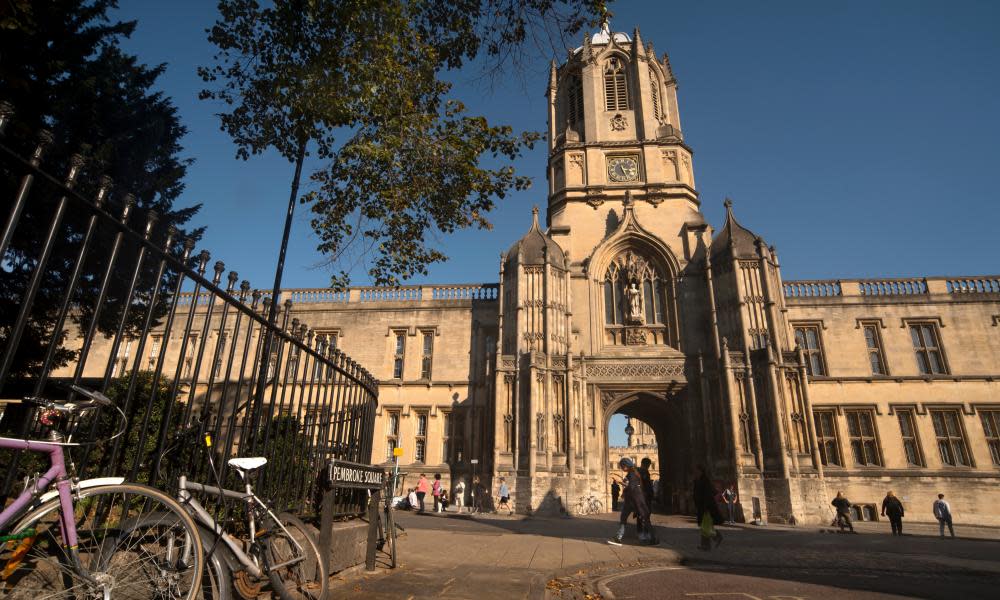How to fix Oxbridge’s biased admissions system

The Sutton Trust, when rightly calling for Oxford and Cambridge universities to “make greater use of contextual data in their admissions process” does not go far enough (Eight top schools dominate entry to Oxbridge, 7 December). A slim chance of success is not the only reason “high-flying pupils from state schools” are far less likely to apply for an Oxbridge place. Fear of humiliation in an interview designed to trip up all but the best prepared must play a significant role; those interviews must focus more on what the candidate knows, and how knowledge gaps can be filled. If private schools have to rely on “personalised mentoring and university preparation classes”, what chance do pupils coming from underfunded state schools have?
“Top” universities should not be choosing candidates schooled in their requirements and traditions, but offering opportunities to the genuinely talented, who gain good grades in spite of their backgrounds. A pupil with three grade Bs at A-level from a school in an impoverished area probably has more talent and innate ability than a pupil from a privileged background even if A-level grades are higher!
Oxford and Cambridge have been criticised for years for what is plainly a biased admissions procedure, and little has changed. It’s time for Labour to threaten legislation within three years that would compel all universities to accept no more than 7% of their undergraduate intake from private schools.
Bernie Evans
Liverpool
• Your report highlights the imbalance in entry to Oxford and Cambridge when numbers of acceptances from state-funded institutions are compared with those from the private sector. I believe two measures would go a long way to redressing the balance.
First, universities which receive government funding would be required to accept students on each course in proportion to the numbers applying from state and private schools, on the assumption that there is unlikely to be an inherent difference in ability between the two groups applying for university.
Second, offers of places should be made only when the qualifying exam results are known, enabling students to target their application in accordance with their results. This suggestion would require significant change to the Ucas process of application but, as a former admissions tutor at one of the Russell group universities, I believe an effective system could be worked out. For universities this could also result in a significant reduction in the time needed to handle admissions.
David Roscoe
East Dulwich, London
• The news re Oxbridge reminded me of my first week as editor of Varsity, the Cambridge student weekly, in 1992. As a product of the fee-paying University College school, and keen to interrogate a Westminster-educated classmate’s observation that he had at least one exact contemporary from his school at most Cambridge colleges, I initiated a survey, asking the top 20 schools and colleges in the 1992 A-level league table published by the Times how many of their pupils had just enrolled at the university. The results, splashed on the front page of the freshers’ edition as “No end to public school monopoly”, revealed that just 10 independent schools had educated 211 of the 2,744 newly arrived undergraduates from UK institutions.
Cambridge and Oxford have unquestionably worked hard to broaden access since the early 1990s, but last week’s figures may entitle certain private school heads – as chief executives of multimillion-pound businesses – to claim extraordinary success in sustaining “market share”.
Daniel Rosenthal
London
• The Oxbridge admissions problem is compounded by wealth inequality: Oxford and Cambridge, with about £5bn each, hold more than three-quarters of the UK higher education sector’s wealth. Each by itself is wealthier than all non-Oxbridge universities combined. I think that if this were more widely known, people would be angrier at how they use this wealth to educate a tiny, unrepresentative elite.
What they should do is educate much larger numbers of people. If they don’t want to do that (and they don’t), they should share some of their wealth with universities that do. With less wealth inequality in the sector, the problem of Oxbridge admissions would become less pressing.
Dr Jonathan Birch
London School of Economics
• Join the debate – email guardian.letters@theguardian.com
• Read more Guardian letters – click here to visit gu.com/letters
• Do you have a photo you’d like to share with Guardian readers? Click here to upload it and we’ll publish the best submissions in the letters spread of our print edition

 Yahoo News
Yahoo News 
